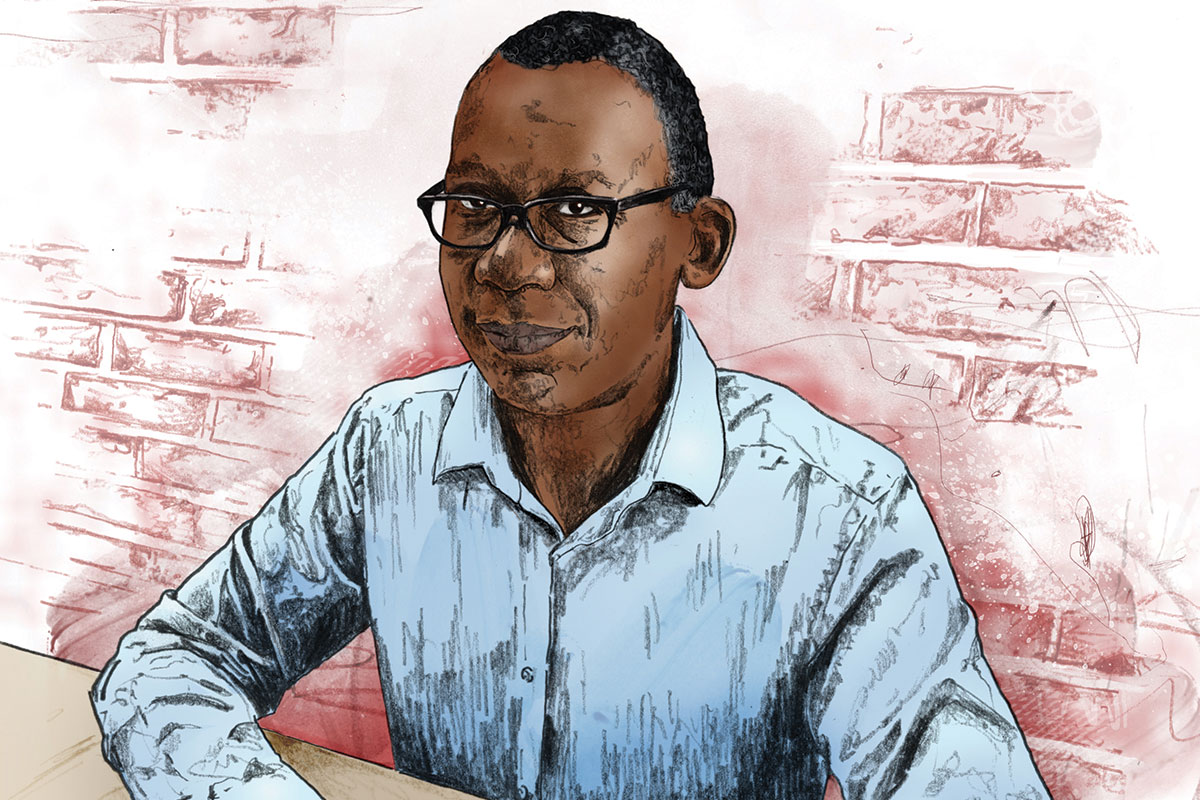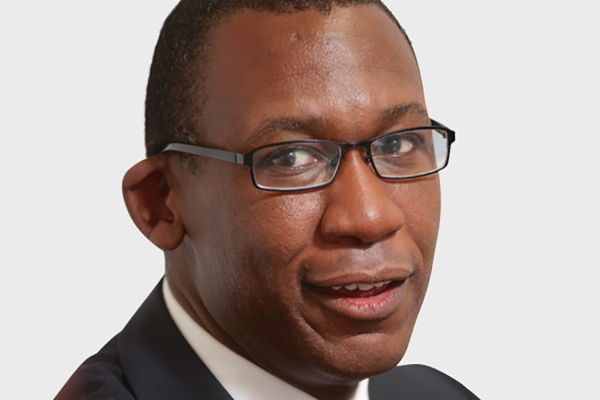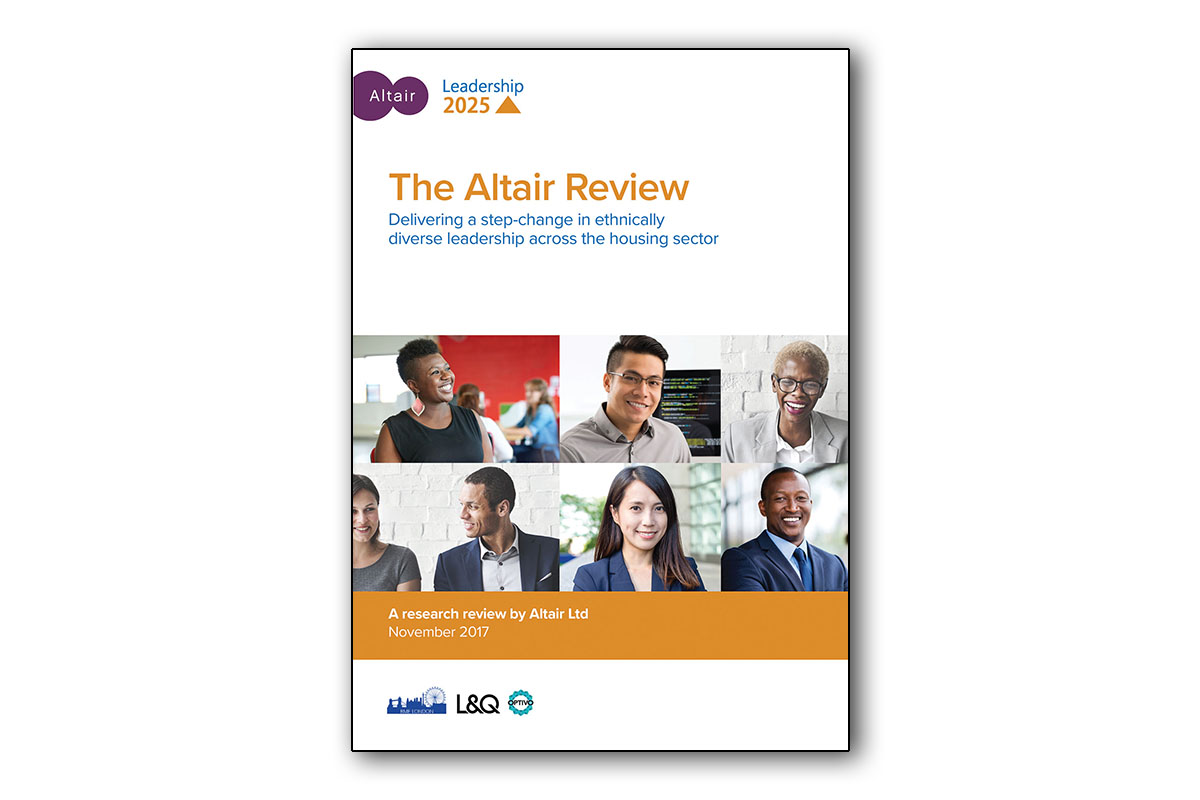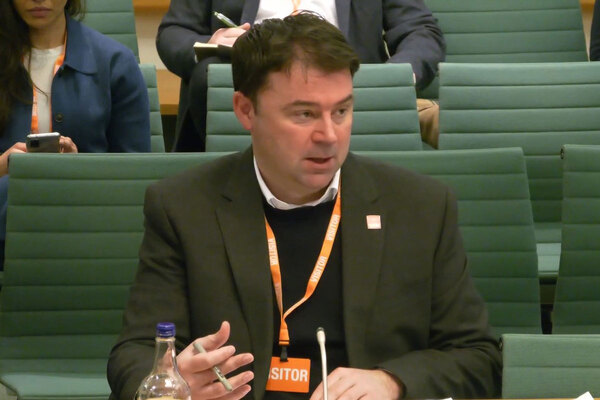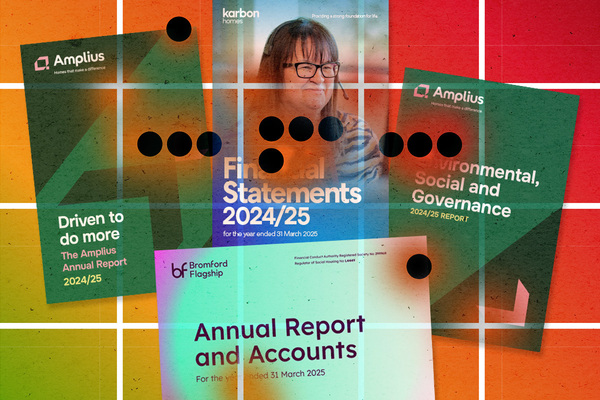You are viewing 1 of your 1 free articles
Steve Douglas: how the sector is responding to this crisis
Steve Douglas talks to Inside Housing about how the COVID-19 response might come to define the housing sector – from reshaping the relationship with tenants to changing business plans and the future of what is built. Jess McCabe reports. Illustration by Scott Chambers
When Inside Housing first arranged to interview housing sector veteran Steve Douglas, we discussed by email what topics should be covered – the Budget, cladding, and housing association governance were all on the agenda. Would we be meeting in the offices of consultancy Aquila, where Mr Douglas was group chief executive or somewhere else?
By the time we came to carry out the interview on 19 March, the world had changed. We spoke via video conferencing, with Mr Douglas dialling in from the office.
Normally Inside Housing would commission a photographer to take pictures of the interviewee, but social distancing has put paid to that.
“How the sector behaves through this crisis will be a really important stake in the ground for our reputation”
The agenda seemed less urgent and we mostly spoke about the sector’s handling of coronavirus. But we were still wondering how big the impact would be.
“In three months’ time it might be business as usual, and the agenda we were talking about last week, we may come back to that,” Mr Douglas wondered, in a comment that now shows how everyone had yet to absorb the scale of the crisis.
By the time of writing so much had changed again, that we had to have a second interview. It was already clear that “business as usual” is not going to be restored within three months.
This time, Mr Douglas video called in from home – one of the many impacts of COVID-19, as well as him having to step down as group chief executive of Aquila in the light of pressures on the organisation.
“There’s still a real need for the services they’re providing, and there’s a great team there. But for me personally and for the benefit of the business, it felt right,” he says.
So we mostly throw out the original agenda and try to see what Inside Housing could learn about where the sector is now and how it can come out of this crisis on the up, from someone who has been working in the heart of housing for decades, including as a former association chief executive, board member and chair of multiple big players, and former chair of the regulator, as well as someone who has spent the past decade working in consultancy with social landlords (see box: A storied housing career).
“You’ve had staff out and about potentially at risk themselves making sure the most vulnerable are supported”
In other words, who is more qualified to see the sector clearly as it is now? Mr Douglas sees the sector’s response to coronavirus as a defining moment that could settle the unease about whether it has drifting from its social purpose.
“How the sector behaves through this crisis will be a really important stake in the ground for our reputation. We have talked about being on the side of tenants – this is the opportunity to demonstrate what that actually means,” he says. So far, the signs are good.
“Up and down the country, housing associations have been supporting tenants and been delivering [for] foodbanks, [and] have been providing grants – so you’ve had staff out and about potentially at risk themselves making sure the most vulnerable are supported.”
That is not to say that Mr Douglas does not think there is more work to be done in providing a structure to make sure associations stay focused on tenants: for example, we talk of how there is a need for a strong, independent organisation that represents the interests of tenants.
We also speak about the co-regulatory settlement – the idea that housing providers engage in the spirit of regulation without being forced to. Mr Douglas thinks the regulator needs to get its mandate to consider resident issues back – something that was largely stripped in 2010 and has been a major talking point since Grenfell.
The Housing Ombudsman’s “beefed up” role in the sector is welcome. But, so far at least, he feels housing associations are demonstrating where their loyalties lie during this crisis.
Then there is the question of how housing associations’ business plans will stand up. “There is a great deal of resilience in the sector. As a sector, we can draw comfort from that.” The sector should have been well served, Mr Douglas adds, by the English regulator’s insistence on them stress-testing their business plans.
Nonetheless, there will be impacts. “Business plans that have been prepared even a year ago will have to be revisited, fundamentally rewritten,” he warns. They were already becoming out of date, especially if they had not been redone to account for fire safety and responses to climate change.
“They’ll now have to be factoring in loss of rent, increased rent arrears, and then there is a wider societal cost around increased unemployment, challenges around tenant sustainability,” he says.
Housing associations should be well positioned to be part of the recovery – looking back to the last big economic crashes in 1993 and 2008, he notes that “history confirms that large-scale infrastructure investment can be key to economic recovery”.
Of course, the difference now is that housing associations are far more reliant on cross-subsidy and sale of homes at market values to underpin the delivery of affordable housing. “It may be a slightly different model that comes out of it, and certainly there will be questions about what tenure mix looks like, but it feels like housing associations and local authorities are even now thinking about the exit strategy,” he says.
Even though sites are, at time of the interview, still broadly shut down, work is under way as associations and local authorities prepare for new developments and some organisations raise significant finance through bonds.
“The budget covered new build, it covered infrastructure, it covered homelessness, it covered rough sleeping. It covered the Building Safety Fund”
Mr Douglas says the Budget in March included welcome signs that the government sees housing as infrastructure.
Noting that he was chief executive of the Housing Corporation during the Decent Homes Programme, he calls chancellor Rishi Sunak’s Budget “the closest that I have seen in my career to an all-encompassing suite of measures”, and “the most Keynesian Budget we’ve seen in a decade”.
“It covered new build, it covered infrastructure, it covered homelessness, it covered rough sleeping. It covered the Building Safety Fund,” he notes.
A storied housing career
Picture: Getty
Steve Douglas grew up in south London, went to state school and then to Oxford, where he studied the famous Philosophy, Politics and Economics course.
“When I finished, I knew two things: one, I didn’t particularly want to go into the private sector. I thought local government was a bit bureaucratic for me – though I was wrong and I’ve subsequently worked in local government and had a great time,” he recalls. “And so I was looking at something that was in between, that had the classic social purpose but had some great career opportunities.”
The answer was housing. He first did an internship at the New York Department of City Planning, where the city (above) was developing an affordable housing programme.
“Unfortunately, I couldn’t extend it beyond that, although I loved New York,” Mr Douglas says. So it was back to London, where he picked up a newspaper and saw an ad for a job with L&Q. His career took off quickly.
“I’ve always been fortunate – I’ve had strong mentors and strong supporters. My first chief executive role was at 29,” he says. By 2007, he was in the top job at the Housing Corporation, which was then the sector’s regulator. He also spent nine years as vice-chair of association Amicus Horizon, which then merged to become Optivo. Stepping down from Optivo’s board, because he had served the full nine years, was one of his toughest moments – he did not want to go. “You want to be part of the journey, you want to be part of the journey forever almost,” he says. Last year he received a CBE.
His proudest moment? Mr Douglas points to his time as chief executive of Spitalfields Housing Association in east London. “We brought in funding to deliver much-needed family accommodation for the local community,” he recalls. “I feel quite proud of having something to do with creating their resilience and supporting their resilience in the early days of my career.”
There were limits, though. The Budget set a figure of £12bn for the next Affordable Homes Programme – a third of what a “consensus” of organisations believe is needed. It supplied an additional £1bn for the Building Safety Fund to address cladding. Yet Mr Douglas points out that in London alone the cost of building safety measures will soar beyond that, and there’s an unanswered question about how the funding gap will be filled.
“Housing and regeneration are in my DNA, so I will in some shape or form stay connected to it”
“The Budget was a really important signal and should be strongly welcomed. The next stage is what happens in the Spending Review,” he notes.
That may be the next big announcement the housing sector is waiting for, but how about what is next for Mr Douglas?
“Housing and regeneration are in my DNA, so I will in some shape or form stay connected to it,” he says.
Indeed, he still has what most people would consider a full plate. Mr Douglas is chair of One Housing and chair of housing charity Commonweal Housing until June. He is on the National Housing Federation’s advisory group for its governance review. He’s also working as an independent advisor to set up a “fast-track programme for emerging talent” for BME people in the housing sector – diversity being the other great driving passion of his career.
This programme will be similar to a graduate programme but not only open to graduates: perhaps someone returning to their career after children or wanting to shift field within housing. This is a project with his old firm Aquila and non-profit Future of London, alongside the Greater London Authority, house builder Hill, and associations Network and Peabody.
“The intention would be to open it for applicants in November and to fully launch it in spring next year,” he explains.
We should expect to hear more from Mr Douglas when the dust settles on the crisis. “I think I’ve probably still got a big job in me. So I am taking a break now and then see what the future holds.”
More on coronavirus
To see all our coronavirus coverage to date – including the latest news, advice to providers, comment and analysis – use the link below.
Sign up to our Best of In-Depth newsletter
We have recently relaunched our weekly Long Read newsletter as Best of In-Depth. The idea is to bring you a shorter selection of the very best analysis and comment we are publishing each week.
Already have an account? Click here to manage your newsletters.
Related stories
